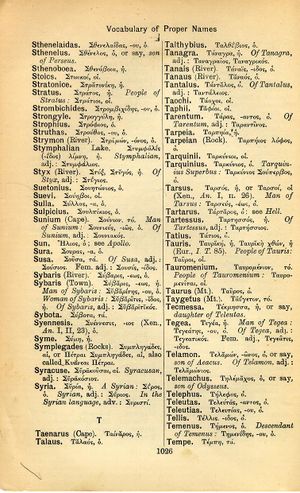Sthenelus: Difference between revisions
(Names) |
(6_15) |
||
| Line 1: | Line 1: | ||
{{WoodhouseENELnames | {{WoodhouseENELnames | ||
|Text=[[File:woodhouse_1026.jpg|thumb|link={{filepath:woodhouse_1026.jpg}}]]Σθένελος, ὁ, or say, <b class="b2">son of Perseus.</b> | |Text=[[File:woodhouse_1026.jpg|thumb|link={{filepath:woodhouse_1026.jpg}}]]Σθένελος, ὁ, or say, <b class="b2">son of Perseus.</b> | ||
}} | |||
{{Lewis | |||
|lshtext=<b>Sthĕnĕlus</b>: i, m., = Σθένελος.<br /><b>I</b> King of Mycenœ, [[son]] of [[Perseus]], and [[father]] of [[Eurystheus]], Hyg. Fab. 244.—<br /><b>II</b> King of the Ligurians, [[father]] of [[Cycnus]], [[who]] [[was]] changed [[into]] a [[swan]], and [[who]], from his [[father]], is called [[proles]] Stheneleïa, Ov. M. 2, 367; cf. sqq.—<br /><b>III</b> One of the [[Epigoni]], [[charioteer]] of Diomede at the [[siege]] of [[Troy]], and one of those [[shut]] up in the [[wooden]] [[horse]], Verg. A. 2, 261; Hor. C. 1, 15, 24; 4, 9, 20.—<br /> A Rutulian, [[slain]] by [[Pallas]], Verg. A. 10, 388.—Hence.<br /> <b>A</b> Sthĕnĕlēĭus, a, um, adj., Stheneleian.<br /> <b>(a)</b> (Acc. to I.) [[Eurystheus]], Ov. M. 9, 273: [[hostis]], i. e. [[Eurystheus]], id. H. 9, 25.—<br /> <b>(b)</b> (Acc. to II.) Proles, i. e. [[Cycnus]], Ov. M. 2, 367.—<br /> <b>B</b> Sthĕnĕlēis, ĭdis, adj. f., Stheneleian: [[volucris]], i. e. [[Cycnus]], Ov. M. 12, 581. | |||
}} | }} | ||
Revision as of 09:07, 13 August 2017
English > Greek (Woodhouse)
Σθένελος, ὁ, or say, son of Perseus.
Latin > English (Lewis & Short)
Sthĕnĕlus: i, m., = Σθένελος.
I King of Mycenœ, son of Perseus, and father of Eurystheus, Hyg. Fab. 244.—
II King of the Ligurians, father of Cycnus, who was changed into a swan, and who, from his father, is called proles Stheneleïa, Ov. M. 2, 367; cf. sqq.—
III One of the Epigoni, charioteer of Diomede at the siege of Troy, and one of those shut up in the wooden horse, Verg. A. 2, 261; Hor. C. 1, 15, 24; 4, 9, 20.—
A Rutulian, slain by Pallas, Verg. A. 10, 388.—Hence.
A Sthĕnĕlēĭus, a, um, adj., Stheneleian.
(a) (Acc. to I.) Eurystheus, Ov. M. 9, 273: hostis, i. e. Eurystheus, id. H. 9, 25.—
(b) (Acc. to II.) Proles, i. e. Cycnus, Ov. M. 2, 367.—
B Sthĕnĕlēis, ĭdis, adj. f., Stheneleian: volucris, i. e. Cycnus, Ov. M. 12, 581.

